Why would they not tell you that your daughter needed a specialist? Just telling you "It's for the best" makes no sense 😲
My Kid Frightened Her Therapist, and the Doctor Revealed an Awful Truth
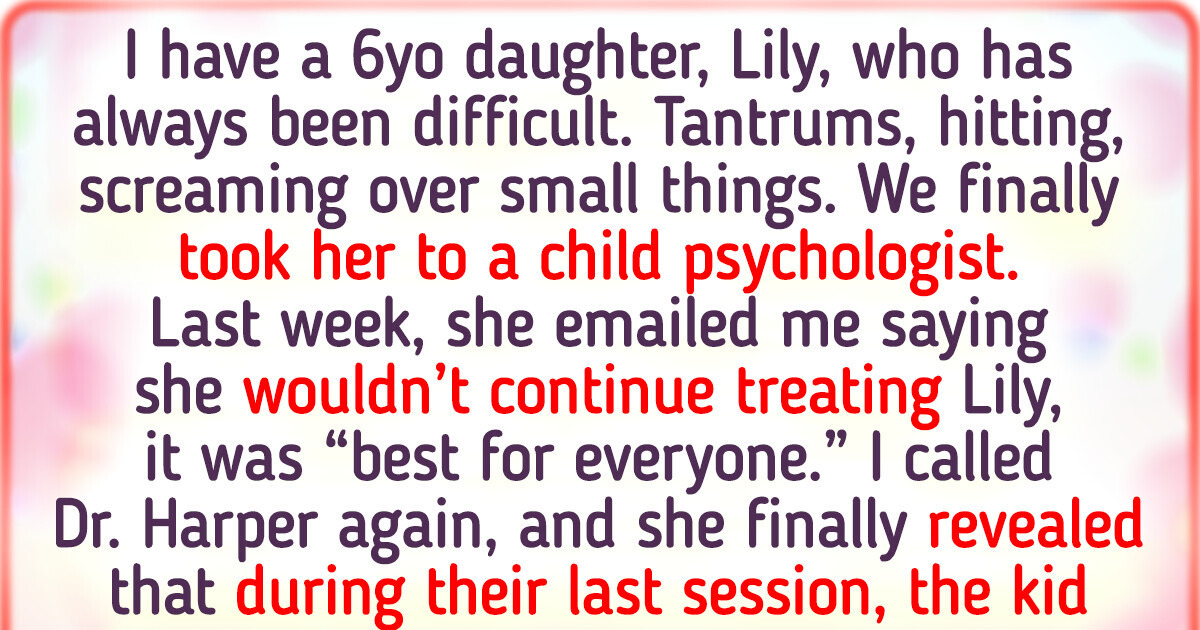
A reader recently sent us a letter detailing the ongoing drama surrounding her 6-year-old daughter, Lily. In her message, she described how Lily’s behavior led to the abrupt end of her therapy sessions and the unsettling discoveries that followed.
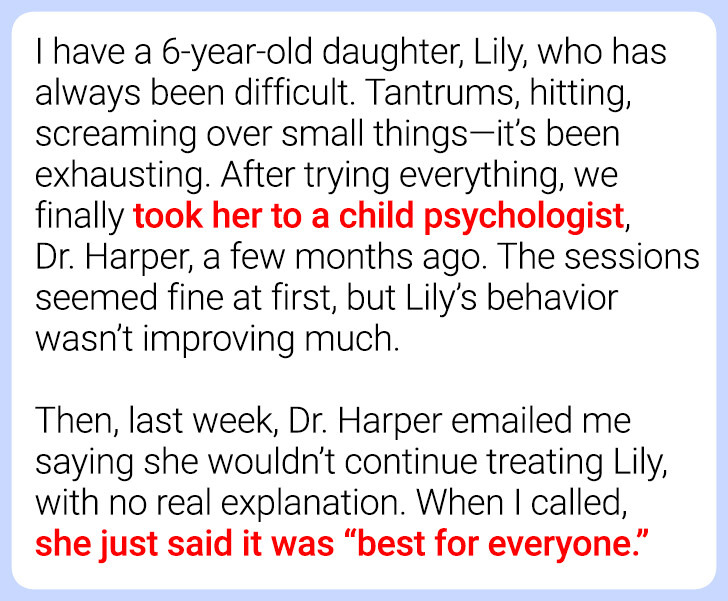
The next day, Lily’s school reported another meltdown where she screamed at a teacher, prompting the counselor to recommend more intensive therapy. Concerned, her parent contacted Lily’s former preschool teacher, Mrs. Morgan, who revealed Lily had talked about an imaginary friend named Emma. That night, the parent discovered a crayon drawing under Lily’s bed showing two girls—one labeled Lily, the other “Emma,” with Emma’s face crossed out in red scribbles.
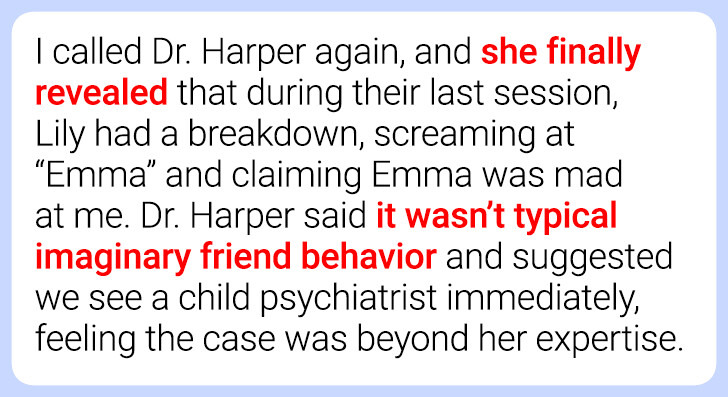
I quite agree, a professional would never respond that way.
Now, the parent is terrified, wondering if this is just a phase or something more serious. With a psychiatrist appointment coming up, they feel lost and are seeking advice from others who might have faced similar situations.
Emotional and behavioral signs of mental health problems in children.
Here are signs of mental health issues in children. If these symptoms persist for more than a few weeks, it's crucial to discuss them with your child and seek professional help.
- Loss of interest in previously enjoyed activities
- Frequent tantrums or aggressive behavior
- Persistent sadness or excessive crying
- Excessive worry or fear
- Avoidance of social situations or intense separation anxiety
- Regression to earlier behaviors, like thumb-sucking or bed-wetting
- Inability to focus, restlessness, or hyperactivity
Physical signs
- Trouble sleeping or excessive sleep
- Difficulty getting up or changes in eating habits
- Significant weight loss or gain
- Unexplained physical pains, such as headaches or stomachaches
School and social signs
- Decline in academic performance
- Difficulty socializing or reluctance to go to school
- Withdrawal from friends and activities
What to do in this situation.
If your child’s mood or behavior changes persist for more than a few weeks and are causing distress, affecting relationships, or hindering daily activities, it’s crucial to seek professional help promptly.
Consider these support options:
- Your child’s preschool or school teacher, or a school counselor
- Your child’s GP or pediatrician
- A psychologist specializing in children and families
- A mental health social worker
- Your local children’s health or community health center
- Local mental health services
We'd love to hear from our readers about how they successfully supported their children through challenging situations—please share your experiences and insights in the comments.
Comments
Your daughter is either schizophrenic or she's a sensitive. She might be able to (plz don't laugh) see things some can't. My oldest was like this. Turns out she is a sensitive one top of autistic. Some "imaginary friends" aren't so imaginary unfortunately.
I believe more kids have this ability than we realize. They haven't yet been taught that it's "impossible ".
Does everything it's supposed to do! His service is more accurate than a lot of the other ones.
RECOVERYBUREAUC via gmail •com really works.
With simply a phone number, I can find and track everyone I wish to keep track of. This app makes it easy to check in on loved ones, find a missing device, or ensure family safety. The real-time tracking is quite accurate, and ghost mode protects my privacy when necessary. A must-have for everyone who wants to remain connected and in control!!!
RecoveryBureauC @ gmail, c0m
Related Reads
I Refuse to Let My Stepson Bring His Mom’s Cooking to My Home
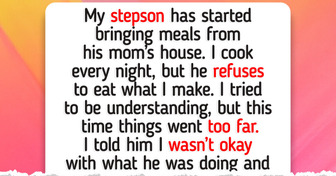
I Won’t Accept Unequal Treatment in the Family Business
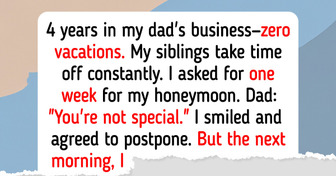
11 Moments That Prove Kindness Is the Warmth the World Needs
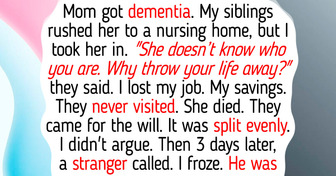
16 Times the People Next Door Surprised Us in the Most Unforgettable Ways
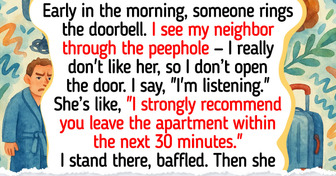
I Said “That’s Not My Job” Once at My Office—And the Domino Effect Was Wild
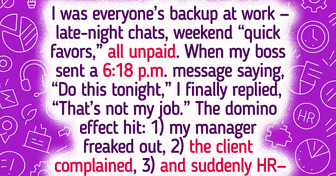
I Refuse to Return to the Office After My Coworker’s ‘Prank’ Revealed His Darkest Secret
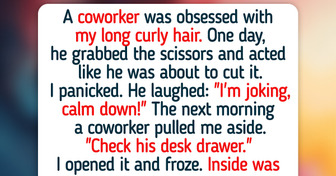
17 Stories That Prove Kindness Is the Most Beautiful Surprise Life Can Give
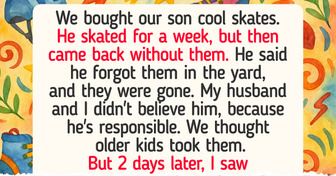
I Refused to Pay for My 80-Year-Old Nana’s Medical Bills—My Kindness Meant Nothing to Her

My Mom Forgot About Me Until She Needed My Help—I Turned the Tables on Her
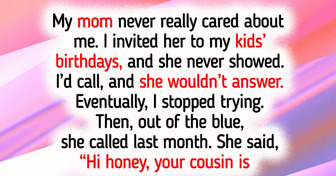
12 Moments That Remind Us Kindness Is What the World Needs Most
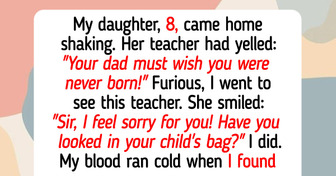
12 Moments That Show Kindness Isn’t Weak—It’s Power in Disguise
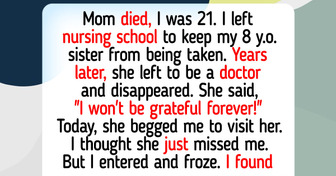
I Raised My Stepson Alone for 10 Years—Then He Broke Me to Pieces

